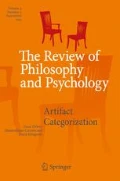Abstract
In their contribution to the Review of philosophy and psychology (19 March 2010), David Faraci and David Shoemaker object to Susan Wolf’s sane deep self view of moral responsibility, which is supposed to accord with our pretheoretical intuitions about deprived childhood victims better than the plain deep-self view. Wolf’s account hinges on the intuitiveness of a particular example, which asks us to consider JoJo, the son of an evil dictator of a small, undeveloped country who grows up to adopt his father’s sadistic values. Faraci and Shoemaker conduct a survey to test naïve reasoners’ intuitions on this case. From the study results, they draw three general conclusions: (i) that Wolf’s view is false, (ii) that DSV is basically adequate, subject to the addition of a scalar dimension which measures degrees of responsibility, and (iii) that JoJo is partially excused by naïve moral reasoners because he is seen as suffering from a rare and peculiar form of moral ignorance, “different in kind from the moral ignorance people usually experience” (p. 327). I dispute these conclusions and present an alternative interpretation of the study, which defends an externalist, Strawsonian account of moral responsibility, and I use this approach to show that JoJo’s circumstances are inherently extenuating (at least to a significant degree). Unlike Wolf’s view and DSV, my preferred account is capable of accommodating the fact that JoJo’s formative circumstances were the only factor that made a statistically significant difference to the subjects’ moral judgments. This is because it is the only view capable of according any degree of intrinsic relevance to such external factors.
Similar content being viewed by others
Notes
For a more fulsome explanation of Faraci and Shoemaker’s theory than I can provide in the limited space of this paper, see “Huck versus JoJo: Moral ignorance and the (a)symmetry of praise and blame,” forthcoming in Oxford Studies in Experimental Philosophy.
Henceforth, the subjects of these scenarios will be referred to as JoJo1, JoJo2, and JoJo3 respectively.
References
Carter, R. 1998. Mapping the mind. London: University of California Press.
Faraci, D., and D. Shoemaker. 2010. Insanity, deep selves, and moral responsibility: The case of JoJo. Review of Philosophy and Psychology 1(3): 319–332.
Fischer, J.M., and M. Ravizza. 1998. Responsibility and control: A theory of moral responsibility. Cambridge: Cambridge University Press.
Lareau, A. 2011. Unequal childhoods: Class, race, and family life, 2nd ed. Berkeley and Los Angeles: University of California Press.
Scanlon, T.M. 1986. The significance of choice. The Tanner lectures on human values vol. 8. Salt Lake City: University of Utah Press.
Sneddon, A. 2005. Moral responsibility: The difference of Strawson, and the difference it should make. Ethical Theory and Moral Practice 8: 239–264.
Strawson, P.F. 1963. Freedom and resentment. In Free will, 2nd ed, ed. Gary Watson, 72–93. Oxford: Oxford University Press.
Watson, G. 1987. Responsibility and the limits of evil: Variations on a Strawsonian theme. In Responsibility, character, and the emotions, ed. Ferdinand Shoeman, 256–286. Cambridge: Cambridge University Press.
Wolf, S. 1987. Sanity and the metaphysics of responsibility. In Free will, 2nd ed, ed. Gary Watson, 372–387. Oxford: Oxford University Press.
Author information
Authors and Affiliations
Corresponding author
Rights and permissions
About this article
Cite this article
Ciurria, M. The Case of Jojo and Our Pretheoretical Intuitions: An Externalist Interpretation. Rev.Phil.Psych. 5, 265–276 (2014). https://doi.org/10.1007/s13164-013-0168-x
Published:
Issue Date:
DOI: https://doi.org/10.1007/s13164-013-0168-x



